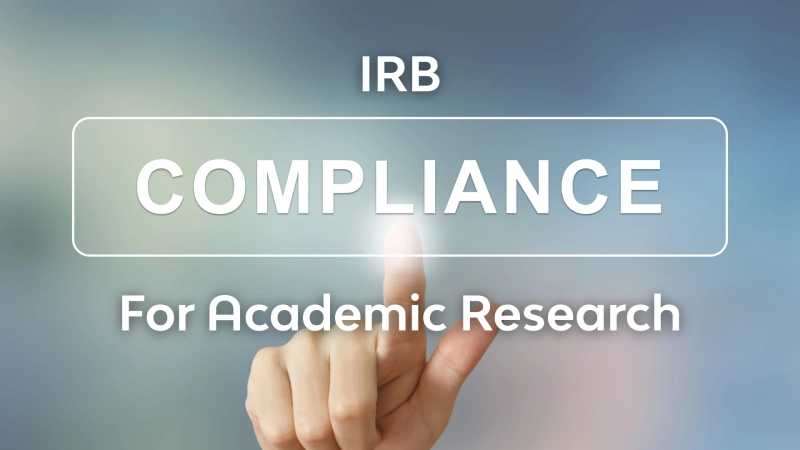In academic research, integrity doesn’t begin with data analysis. It starts with ethical design. Whether you're conducting one-on-one interviews, running surveys, or observing behavioral studies, your first priority is to protect the rights and privacy of your participants. That’s where the Institutional Review Board (IRB) comes in.
The IRB exists to ensure that research involving human subjects upholds high ethical standards. But navigating the IRB process can be intimidating, especially for early-career researchers. This guide will help you understand the essentials of IRB approval and help you keep your research ethically sound and audit ready.
1. What Is an IRB and Why Does It Matter?
An Institutional Review Board (IRB) is a committee established to review and approve research involving human subjects. Its core purpose is to protect the rights, welfare, and privacy of participants. Universities, hospitals, and research institutions typically have their own IRBs, guided by federal regulations such as the Common Rule (45 CFR 46).
IRBs evaluate your study design, data handling practices, consent procedures, and potential risks to participants. Without IRB approval, your research may not qualify for publication, funding, or institutional support.
2. What Types of Research Require IRB Review?
Not all research needs full IRB scrutiny, but many projects involving people do. Here’s a breakdown:
Requires Review:
- Interviews and focus groups
- Online or in-person surveys
- Observational studies
- Audio or video recordings of individuals
May Be Exempt or Expedited:
- Anonymous questionnaires
- Archival or publicly available data
- Studies with minimal risk
Doesn’t Require Review:
- Internal program evaluations not intended for publication
- Non-human subject research (such as analyzing published texts)
Understanding where your research falls helps you prepare the right documentation and manage timelines effectively.
3. The Core Principles Behind IRB Compliance
IRB decisions are based on three ethical principles from the Belmont Report:
- Respect for Persons: Participants must give informed, voluntary consent
- Beneficence: Researchers must minimize harm and maximize benefits
- Justice: Risks and benefits of research should be fairly distributed
These principles guide everything from how you recruit participants to how you store and share their data. Failing to align with them could lead to denied approval or ethical violations that could jeopardize your study and reputation.
4. Preparing for the IRB Process
A well-prepared application increases your chances of smooth approval. Consider these essentials:
- Clear Research Purpose: Define your goals, methods, and participant demographics
- Consent Forms: Write them in plain language and explain risks, benefits, and withdrawal rights
- Privacy Measures: Detail how you’ll protect participant identities. This is where transcription and data storage decisions matter
- Data Use Plans: Clarify how long you’ll retain data, who has access, and how it will be destroyed or anonymized
Start early and consult your IRB office if you're unsure. Most institutions also provide templates and examples to streamline the process.
5. Common IRB Pitfalls to Avoid
Even strong proposals can get delayed due to avoidable mistakes. Some common issues include:
- Collecting identifiable data without explaining safeguards
- Overlooking consent for audio or video recordings
- Inconsistent data security plans
- Using AI tools like automatic transcription without clarifying how data is handled
Being thorough with your documentation and proactive about privacy reduces delays and protects participant trust.
6. The Role of Documentation in Ethical Research
Documentation isn't just about ticking boxes. It’s about accountability. Maintaining accurate records throughout your project helps ensure transparency and simplifies any required audits or post-approval reporting.
Where transcription fits in:
If your research includes recorded interviews or focus groups, transcripts provide a secure, searchable, and reviewable alternative to raw recordings. Professionally managed transcription can:
- Make redaction of personal identifiers easier
- Provide time-stamped clarity for complex dialogues
- Reduce storage and access issues related to audio or video files
Choose services that offer confidentiality agreements and secure handling, especially when working with sensitive populations.
7. What Happens After You Get IRB Approval?
IRB approval is not a one-time event. It’s an ongoing responsibility. You’ll need to:
- Submit amendments if you change your research scope or methods
- Report any unexpected risks or ethical concerns
- Renew your approval if your study extends beyond the initial timeframe
- Maintain records of consent, procedures, and communications
Failing to keep up with these obligations can lead to suspension or retraction of IRB approval.
8. Tips for a Smoother IRB Experience
- Start Early: IRB timelines can vary. Don’t leave it for the last minute
- Use Institutional Resources: Many universities offer workshops and one-on-one IRB consultations
- Choose Ethical Tools: From transcription vendors to survey platforms, work with partners that align with data security standards
- Communicate Clearly: The more precise your application, the faster the review process
Remember, IRBs are not your adversaries. They’re your partners in protecting participant welfare and ensuring research quality.
Conclusion: Compliance Is Part of Research Excellence
Understanding and respecting the IRB process isn’t just about meeting requirements. It’s about honoring the people who make your research possible. Ethical oversight, secure documentation, and responsible practices are foundational to meaningful, publishable work.
Transcription, while a small part of the process, can support your commitment to data integrity and participant confidentiality when done right. As academic researchers, the goal isn't just to gather knowledge. It’s to do so in a way that reflects care, responsibility, and professionalism.
FAQs
Do I need IRB approval for research using existing datasets?
Maybe. If the data is publicly available and doesn’t contain identifiers, you may be exempt. Always check with your IRB.
Can I use AI transcription tools for interviews?
You can, but ensure the tool complies with data security standards. For sensitive topics, human transcription with signed NDAs is often preferred.
How long does IRB approval usually take?
It varies by institution and review level. Exempt reviews may take one to two weeks, while full board reviews can take a month or more.
What happens if I skip IRB approval?
Your research may be deemed unethical, unpublishable, or even retracted. In some cases, funding can be withdrawn or legal consequences may follow.



